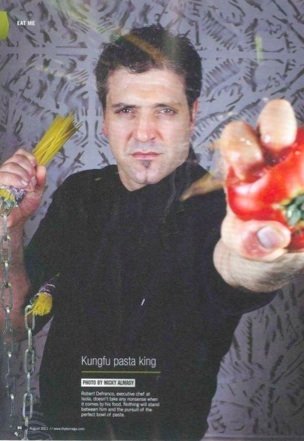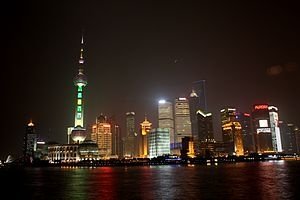The proposal of opening a new Italian restaurant arrived out of the blue, in springtime and far away from Shanghai. In my mind, this was the city of bicycles, of men and women wearing a black uniform, of soldiers in grey coats, walking down roads crowded with rickshaws. As soon as I landed, a group of representatives from the company boarded me on a limousine and took me around the town. «So much for the bicycles», I thought.
What I saw was a Shanghai full of ferment. I was captured by the energy of change and the signs of the sudden wealth were visible in every corner: everywhere, huge cranes were at work, enormous working sites were hiding gigantic works. The location chosen for the restaurant was not less so, inside a luxurious tower, with a beautiful luminous room with a terrace in front of the Pearl Tower, the symbol of modern Shanghai. I was conquered by the atmosphere, the positive attitude, the capacity of investing.
I decided to accept the challenge: opening a restaurant that would serve an authentic Italian cuisine, using Italian products in China. I suddenly found myself at the stoves in a restaurant immersed in the nature of the Tuscan hills, inside the Isola Shanghai, in a huge metropolis on the other side of the world. I moved from running a small team to a staff of thirty chefs, many of whom spoke only Chinese.

Local press portraits him as a KungFu pasta king
The first difficulty was finding the raw materials. I decided to select the suppliers and importers in order to have all that was possible from Italy. Burrata from Apulia, cherry tomatoes from Sicily, truffle from San Miniato. The obscure and intricate regulation of imports to China had given life to realities which, observed from outside the Great Wall, looked surprising. With experience, I learnt that some products, such as salami, could arrive via alternative channels: I would have never thought I’d become a pancetta smuggler.
They had given me two months’ time to find the suppliers of raw materials, to purchase the tools and to create a kitchen team. All this in a language and a town I didn’t know. I had to learn Chinese legislation, in order to manage the contracts with my staff, their holidays and salaries. The training was as extenuating as explaining the concept of Italian cuisine and its ingredients. And the use of salt too, unknown over there: Chinese dishes are almost always either too salt-less or too salty.
I wanted Isola Shanghai to produce everything: bread, pasta, desserts, sweets. A long haul. Cooks were always tricking me by saying «yes chef». They never had a doubt, never had a question. In fact, I then understood this behaviour is the result of the strong sense of pride, of “reputation” the miànzi which, together with guanxi - “relationships”, acquaintances – have a large socio-dynamic value for the Chinese. You should never admit you haven’t understood, especially not in front of others. Thus communicating even the most simple concept became a huge task and generated an incredible waste of energy and time. Therefore, we were proceeding with an exasperating slowness.

Pudong by night, Shanghai
One night, after the first week of training, with the restaurant now empty, I leaned on the great windows overlooking the still illuminated Pearl Tower. I thought I would never make it. The opening day arrived and somehow all the pieces of that puzzle magically fell into place. Beyond the rosiest expectation, the opening was on time and the food was absolutely Italian, both in taste and shape.
One day, an elegant lady who enthusiastically declared she loved Italian food asked me if I could prepare her favourite dish, Pasta all'Alfredo. Half amused and half embarrassed I confessed I had never heard of it before. She looked at me suspiciously and asked me: «are you sure you’re Italian?».